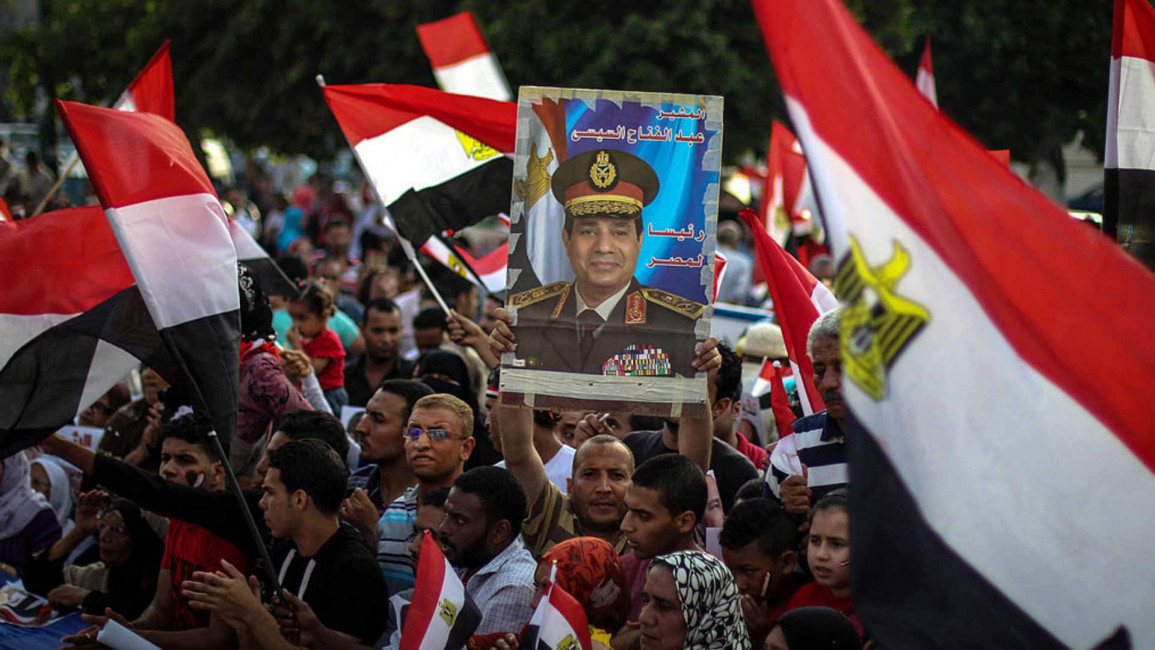
Tyranny grants populism new life in Egypt
Populism also injects a lot of fear and tension into politics by dividing societies into two antagonistic groups; a pure people who are facing daily injustice and attacks against their values, way of life and resources, and a corrupt elite that amasses unchecked economic and political power, undermines the legal and institutional foundation of justice, and conspires against its own people.
In response, populism calls for the empowerment of the people even against the forces of democracy itself. Populist leaders often claim to represent the will of the majority and to seek to protect it by amassing political power and restraining the forces of other corrupt groups, such as elites or even minorities, who are usually accused by populists of conspiring with the elites against the native majority.
Such hardline views misuse democracy by claiming to defend and empower the people on one side, and by attacking fundamental democratic principles such as the protection of minorities and political competitiveness on the other.
Populism thrives on political and economic crises, such as severe economic inequality, political oppression and civil tension. It flourishes in societies that suffer deep and widespread feelings of deprivation, a lack of representation and elite neglect.
 |
Democracies are more capable of confronting populism by exposing its hardline ideology and by expanding participation and equality |  |
As an ideology, populism is often found deeply rooted in authoritarian societies suffering widespread inequality and a lack of representation. However, as a movement populism thrives more in democratic regimes as they allow populist leaders room to mobilise and spread. In other words, populism as an ideology is more rooted in oppressive and authoritarian regimes, but its movements are more organised and powerful in democratic societies.
This does not mean that democracies are more prone to populism. On the contrary, democracies are more capable of confronting populism by exposing its hardline ideology and by expanding participation and equality.
 |
|
|
An anti-military rule protester wears a hat holding portraits |
Dictators can kill or arrest populist leaders but they create the right environment for populism to live and spread. Moreover, dictators usually employe populism against their political opponents by claiming that opposition serves foreign agendas and selfish interests that don't reflect the will of the people.
In recent years, Egypt has known three types of populism.
The first is a religious one spread by political religious groups such as the Muslim Brotherhood and Salafis who claim to defend the pure religious people against the corrupt secular elites. They see Egyptians as traditionally religious and conservative people who aspire to stricter implementations of religious teachings in all aspects of life.
They also blame Egypt's problems on the secular elite, which they portray as more loyal to religious minorities at home and to foreign religions abroad.
The second is a socialist populism that goes back intellectually to the early 20th century, and politically to the Nasser regime that ruled Egypt in the 50s and 60s. Nasser's
socialist and populist regime persecuted the pre-independence political and economic elite, nationalised and seized key industries, and built a one-party state that mobilised people against elites and in favour of its socialist policies.
Such ideological model of a strong leader, who appeals to the masses, suppresses the elites and redistributes wealth through subsidies and public jobs, is prevalent in Egypt.
After the Jan 2011 revolution, socialist populism appeared alive and well. The business elites were often described as corrupt, neo-liberal, loyal to the West and international financial organisations, and unpatriotic.
 |
As an ideology, populism is deeply rooted in authoritarian societies as they usually suffer widespread inequality and lack of representation |  |
In the absence of well-developed political parties and programmes, many saw the solution to the country's economic problems in employing radical measures, such as seizing the wealth of top businessmen, re-nationalising the main industries and increasing taxes and subsidies.
Religious and economic populisms are grassroots ideologies and movements in Egypt whose roots stretch back for decades. They exist as a reaction to the widespread economic inequality and political oppression under the various authoritarian regimes that ruled the country since independence. They are widespread as ideologies and will continue to exist for many years to come as part of the legacy of tyranny.
As movements, they flourished more under competitive and open authoritarian regimes, such as the Mubarak one during its final years in power. At that time, a more internationally open and internally confident Mubarak allowed a room for opposition to organise. As a result, after the January revolution, Egyptian politics was overwhelmed by strong populist trends that ran against the requirements of democratic transition.
 |
Egyptian authorities have employed a different and more political brand of populism, which focuses on attacking Egypt’s pro-democracy elites |  |
Religious populists saw post-revolutionary politics as an opportunity to spread religiosity and to limit the rights of minorities and secularist groups. They spoke in terms of religious wars and how the country's religion, Islam, is under attack by the secular elites who are more sympathetic and loyal toward Egypt's Christian minority and foreign religions.
As a result, religious tension became a major cause for political polarisation that undermined Egypt's fragile democratic transition.
 |
|
|
Pro-Muslim Brotherhood protesters pray during a protest against |
Socialist populists also gained ground after the revolution by blaming the country's economic woes on Mubarak's business elite. They spread the notion that there are simple answers to Egypt's economic problems. They advocated seizing the assets of top businessmen, nationalising key industries and redistributing national wealth through more government subsidies and jobs.
They gave the people the false impression that fixing the economy is an easy, a one formula task, and thus added to people's frustration and impatience with post-revolutionary slow and painful democratic transition.
Counter to religious and economic populisms which are more opposition and grassroots, the Egyptian authorities have employed a different and more political brand of populism, which focuses on attacking Egypt's pro-democracy elites as special interest groups who are out of touch with reality, and more loyal to foreign agendas such as human rights and democracy.
According to such populism, ordinary Egyptians are state-loving people who want stability and economic prosperity and are not interested in western notions such as democracy, and press freedom.
As a result, revolutionary youth and pro-democracy advocates were portrayed as small networks of corrupt Cairo-based elites financed by foreign countries and international NGOs working in Egypt, and who are spreading frustration and turmoil among the people in response to the interests of their foreign financiers.
Such populism was widely employed by the authorities after the July 3rd military coup that ended Egypt's short lived democratic transition.
As a presidential candidate, Abdel Fattah el-Sisi, who as defense minister led a military coup against Egypt's first democratically elected president, used populism against his opposition and pro-revolution voices.
"The public opinion is asking me to fix the situation, to be decisive, and not to deal with mercy and compassion as I am doing now… people want to eat and drink and live. This is a major issue," Sisi told the press as a candidate.
|
|
||
|
Sisi claimed that the Egyptian people don't want him to be merciful when dealing |
Sisi and pro-regime media used populism to incite the masses against pro-democracy and revolutionary voices, who were often portrayed as elitist and unpatriotic. As a result, a massive wave of violent attacks against opposition activists, media and foreigners engulfed the country in the aftermath of the military coup.
However, as the new regime stabilised, it was forced to curtail the forces of populism because it also entails the mobilisation of the masses, and advocates for their participation. Such notions run contrary to the interests of the new oppressive and semi-totalitarian regime.
Under the Sisi regime, political participation is virtually banned, all opposition ideologies and groups are suppressed, and independent media is banned or persecuted.
Instead, the regime advocates an elitist, authoritarian and pro-military ideology that calls for the concentration of power in the hands of the president himself who is portrayed as a saviour of the nation and a protector of the general will.
As a result, populism as a movement has been suppressed in Egypt for the time being. However, it is ideologically vibrant as manifested on opposition media. Under authoritarian regimes, pluralism struggles ideologically and populism flourishes. Oppression may suppress grassroots populism or manipulate it against the opposition, but tyranny grants populism new life under the surface and paves the road for its long-term prosperity on the expense of the forces of democracy and pluralism.
Alaa Bayoumi is an Egyptian journalist and the author of two books studying US foreign policy in the Middle East. He also writes on democratic transition in the Arab world.
Follow him on Twitter: @Alaabayoumi
Opinions expressed in this article remain those of the author and do not necessarily represent those of The New Arab, its editorial board or staff.





 Follow the Middle East's top stories in English at The New Arab on Google News
Follow the Middle East's top stories in English at The New Arab on Google News


